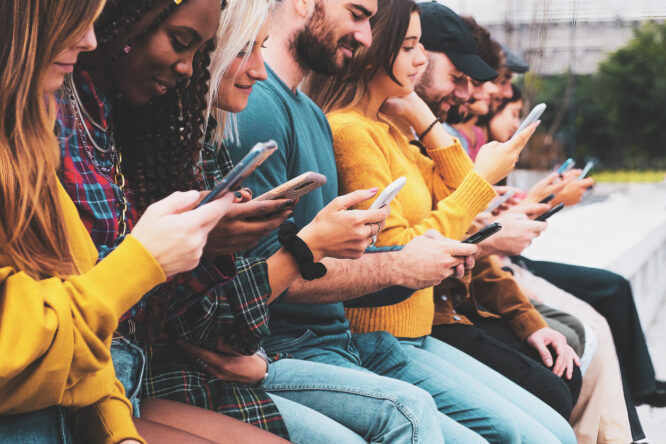Technology is everywhere—phones, laptops, watches, even fridges now.

That means most of us are glued to a screen more than we want to admit. However, there’s a point where heavy tech use quietly changes from “normal” to “uh-oh.” Here are some warning signs your technology addiction might actually be becoming a serious issue, and you need to be paying more attention to it (and maybe even getting some help).
1. You check your phone without even realising you’re doing it.

One minute you’re working or hanging out with friends, the next you’re scrolling Instagram or checking emails without even making a conscious decision to pick up your phone. It just… happens on autopilot. When reaching for your phone becomes a reflex instead of a choice, it’s a pretty solid clue your brain’s got a little too wired into constant stimulation. You’re not even getting the “joy” of it anymore. It’s just habit at this point.
2. A few minutes online somehow turns into hours.

You jump on to check one quick thing—a text, an article, a funny video —and next thing you know it’s dark outside, your coffee’s cold, and you have no idea where the last two hours went. If time keeps slipping away whenever you’re on a screen, it’s a sign the apps, games, or websites you’re using are designed to hook you hard. It also means they’re working a little too well on you.
3. You feel anxious when your phone isn’t nearby.

That panicky feeling when you can’t find your phone is totally normal every once in a while. However, if you feel genuine anxiety every time your phone’s out of sight, even for a few minutes, it’s a sign of deeper dependency. Your brain is treating your device like a literal safety blanket. When something that’s supposed to be a tool starts feeling like a life support system, it’s worth paying attention to that change.
4. You find yourself doomscrolling even when you know it’s making you feel worse.

You’re tired, you’re stressed, you know that checking the news or refreshing your feed will just make you feel worse—and yet… you do it anyway. It’s like watching a slow-motion car crash you can’t look away from. When you keep choosing content that drains you instead of helping you recharge, it’s a major red flag that your tech use isn’t really about entertainment anymore. It’s about feeding a habit you don’t fully control.
5. You multitask everything with a screen.
 Source: Unsplash
Source: Unsplash Watching TV while scrolling TikTok while answering emails? If that sounds like a normal night for you, it’s a hint your brain has got so hooked on stimulation that one thing at a time doesn’t even feel “enough” anymore. Multitasking like that doesn’t actually make you more productive. It just scatters your focus and makes everything feel a little bit half-done. After a while, it trains your brain to expect constant chaos just to feel “normal.”
6. Real-life conversations feel harder to pay attention to.

When you’re so used to getting rapid-fire updates, notifications, and instant responses from your phone, sitting through a slow-paced, meandering real-life conversation can start to feel weirdly difficult. If you catch yourself zoning out when someone’s talking or feeling impatient because a conversation isn’t “moving fast enough,” it’s a sign technology might be rewiring your attention span in ways you didn’t mean to sign up for.
7. You start feeling restless or irritable without screen time.

Ever notice how cranky you get when your Wi-Fi’s down or your phone’s dead? If even short breaks from technology make you feel jumpy, bored, or weirdly angry, that’s withdrawal—and yes, it’s real. When your mood crashes without a screen in your hand, it’s not just about being bored. It’s a clue your brain’s got addicted to the easy dopamine hits that technology pumps out with every swipe and scroll.
8. You’re glued to your phone even when you’re with other people.

Supposedly “hanging out” with friends, but secretly texting other people under the table? Scrolling TikTok at family dinners? Checking your work emails during date night? Yeah, not a great sign. When real human connections start feeling like background noise to your online life, it’s a pretty strong signal that tech is crowding out the things that actually feed your relationships and happiness long-term.
9. You stay up way later than you meant to because of screens.

You tell yourself you’ll just watch one more episode. Or scroll for five more minutes. Or read one more article. Suddenly it’s 2 a.m., you’re still awake, and you have no idea where the night went. When tech keeps hijacking your sleep, it messes with everything—your focus, your mood, your health. When it happens night after night, it stops being a harmless habit and starts seriously messing with your life.
10. You feel “off” when you’re not constantly entertained.

Ever find yourself reaching for your phone during the five seconds you’re waiting for the kettle to boil? Or flipping open a new tab the moment your brain has a lull? That’s your attention span waving a little white flag. If you can’t tolerate even a tiny pocket of boredom anymore without needing instant entertainment, it’s a sign your brain has got wired for constant distraction, and that’s a tough habit to break if you don’t catch it early.
11. You keep promising yourself you’ll cut back, but never actually do.

You set screen time limits. You make resolutions to read more books. You promise yourself you’ll leave your phone outside the bedroom. But somehow, the habits creep right back in within a few days. When you can’t stick to boundaries you set for yourself, even ones you genuinely want, it’s a major clue that your tech use has shifted from “just a habit” to something more like an addiction that needs a real plan to break.
12. Your devices feel more comforting than actual people sometimes.

When you’ve had a rough day, is your first instinct to text a friend… or to binge YouTube videos? Is it easier to lose yourself in TikTok than to call someone and actually talk it out? If tech feels like your main emotional support system, it’s worth checking in with yourself. Screens can be a great distraction sometimes, but if they’re replacing real emotional connections, they might be taking more from you than they’re giving back.




